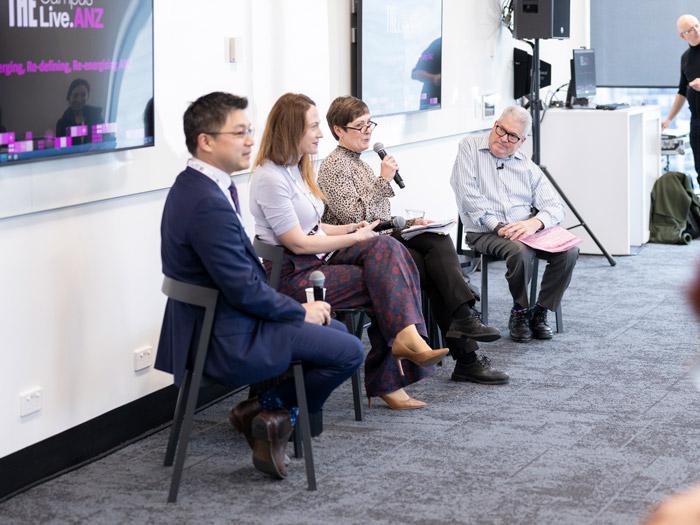
Build a practitioner community to embed industry experience into your courses

You may also like
Popular resources
As business school teachers, industry-based practitioners provide professionally relevant and applied learning opportunities that enhance students’ educational experience and prepare them for future employment. This article provides guidance based on our experience of employing a large team of practitioner colleagues at a leading business school.
The challenge of preparing students for future employment and sustainable careers has motivated universities to try to bridge the gap between theory and practice. This has become more important as new competitors enter the market and as factual and theoretical knowledge is increasingly available and accessible online. Business schools are employing innovative means of bringing industry relevance into the classroom to enhance students’ applied learning opportunities.
Responding to the need to embed practical expertise and content relevance more fully across programmes, Strathclyde Business School has introduced the Strathclyde Global Practitioner initiative. This new class of colleagues from a range of industries and backgrounds reflects our broad range of subjects and the diversity of our students.
Build a diverse community of global practitioners
Our global practitioners come from seven countries. Half are Strathclyde alumni with qualifications including PhDs and MBAs. They hold a variety of roles, including finance director, supply chain manager, CEO for a coaching company, chief innovation officer and management consultant.
Contracts are fractional with annualised hours allowing flexibility to involve management practitioners in a range of activities across programmes. As members of staff, global practitioners are part of the academic community and have access to university resources.
Opportunities and benefits
Module contributions
Global practitioners should be closely involved in the development of module materials such as videos, case studies and assignments, the delivery of lectures and facilitated discussions. In the MBA strategic leadership development module, for example, we draw on the leadership expertise of our global practitioners. Their personal and professional development knowledge is employed to facilitate classrooms across our international MBA centres, curating live business challenges for students and generating a global community of learning through diversity of thought and experience.
Applied learning
As active engagement in applied learning activities is increasingly adopted in the classroom to develop graduates who can work with new knowledge, skills and methods, industry-based colleagues should have a critical facilitation role. These colleagues can also guide the incorporation of applied practical knowledge and experience into the curriculum.
Global practitioner Brian Mooney said: “Access to a wide range of current strategy and leadership challenges in companies is one of the key attributes that global practitioners bring to the business school. I’ve provided case studies and client connections for programmes based on the strategic thinking skills that I have observed and practised on strategy projects with many clients.
- THE Awards 2024 spotlight: learn from the best in UK and Irish higher education
- Three ways to embed career development learning more deeply in your curriculum
- Spotlight guide: Getting students workplace-ready
“The idea of a global practitioner is to complement the traditional research-qualified academic faculty and enhance the student learning experience, as well as provide extended reach for the university into international business networks. I’m always looking for ways to connect my clients and contacts with the business school for mutual benefit.”
Innovation and impact
Global practitioners can make distinctive contributions to projects and activities associated with innovation and impact strategy by facilitating challenge-led research, coaching, advising and engaging their networks for effective knowledge exchange.
A worthwhile investment
The costs of forming authentic academic-practitioner teams, including the budget commitments on contracts, management overheads and staff development, brings positive stakeholder value.
Student feedback demonstrates the positive impact on the learning experience.
“Students were excited about the real-world examples and the possibility of discussing some of their career experiences, challenges and aspirations with people from industry,” according to global practitioner Nada Khorchid.
Academic colleagues value working with global practitioners, noting how practical experience of management practice and distinctive knowledge complements the academic theory.
There are also added benefits for alumni engagement. Because many global practitioners are alumni, the initiative provides a platform for continued alumni engagement.
Quick tips for setting up a business school community of practitioners
- Identify areas where industry figures could add value.
- Build on existing industry relationships to embed these into the business school.
- Provide access to university systems.
- Create physical and virtual spaces to facilitate in-person and online community building.
- Ensure structures facilitate engagement with academic and other colleagues across the school.
- Allocate responsibility for the leadership of the initiative including from within the global practitioner community.
Building industry practitioner communities in universities offers an opportunity to redefine the standards for engaged learning in management education. This is only one example of bringing industry experience into programmes such as MBAs. We have relationships with industry across the business school, some of which have grown organically and some of which we have specifically developed to give our students the industry experience we pride ourselves on as “a place of useful learning”.
Lesley Pender is MBA director and deputy director of Strathclyde executive education and development at Strathclyde Business School, University of Strathclyde.
Strathclyde Business School was shortlisted for Business School of the Year at the Times Higher Education Awards 2024 #THEAwards. A full list of shortlisted candidates can be found here.
If you would like advice and insight from academics and university staff delivered direct to your inbox each week, sign up for the Campus newsletter.
Additional Links
For more resources on this topic, visit our spotlight guide to how to work well with industry.


